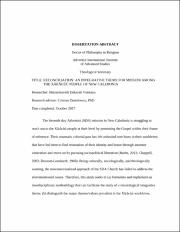Reconciliation : an integrative theme for mission among the Xaracuu people of New Caledonia
Abstract
The Seventh-day Adventist (SDA) mission in New Caledonia is struggling to reach out to the Xârâcùù people at their level by presenting the Gospel within their frame of reference. Their traumatic colonial past has left unhealed core hurts in their worldview that have led them to find restoration of their identity and honor through ancestor veneration and move on by pursuing sociopolitical liberation (Barbe, 2013; Chappell, 2003; Dousset-Leenhardt, 1969). Being culturally, sociologically, and theologically wanting, the noncontextualized approach of the SDA Church has failed to address the aforementioned issues. Therefore, this study seeks to (a) formulate and implement an interdisciplinary methodology that can facilitate the study of a missiological integrative theme, (b) distinguish the major themes/values prevalent in the Xârâcùù worldview,
(c) identify an integrative theme that can facilitate the communication of the Gospel in their frame of reference, and (d) determine its theological and missiological implications. An interdisciplinary approach integrating ethnohistory, ethnography, and missiology was used as the research design. Participation observation, interviews, and archival research facilitated the collection of data. The integrating theme was deduced through thematic network analysis procedure and its biblical relevance was examined before being authenticated as a missiological integrative theme. Out of the identified 226 basic themes, 18 organizing themes and 5 global themes were deduced. The 3 global themes from the ethnohistorical data were (a) colonization and Christianization shamed the natives, (b) the Kanak cultural awakening is a response towards the restoration of the natives‘ identity and honor, and (c) there is a yearning for healing and reconciliation. The 2 global themes at the heart of La Coutume’s ritual were (a) La Coutume as a way of being, relating, and establishing peace and (b) reconciliation through restoration of honor. Reconciliation is an integrating theme deduced out of the 5 global themes and subsequently proposed as an integrative theme after its biblical relevance was affirmed. Its relevance as a hermeneutical lens for the contextualization of theology in the Kanak setting is validated by portraying how challenging biblical concepts can be presented in their frame of reference. Recommendations are provided as per how the reconciliation framework can be used to foster a people-oriented mission approach in New Caledonia. It is also proposed as an approach fit for mission in spiritualistic, group-oriented, and conflictual settings where there is a need to present the Gospel as addressing shame, fear, and damage. It helps to reorient mission to restore God‘s honor and people‘s relationship with Him.


